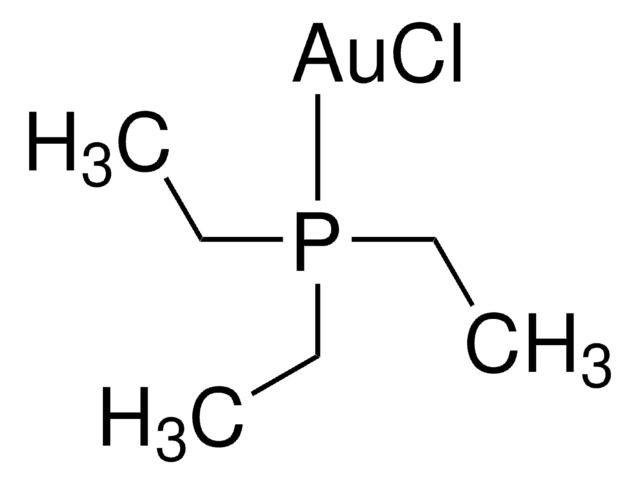481130
Gold(I) chloride
99.9% trace metals basis
Synonym(s):
Aurous chloride, Gold monochloride
About This Item
Recommended Products
Assay
99.9% trace metals basis
form
powder
reaction suitability
reagent type: catalyst
core: gold
impurities
≤1500 ppm Trace Metal Analysis
mp
289 °C (dec.) (lit.)
density
7.57 g/mL at 25 °C (lit.)
SMILES string
[Cl-].[Au+]
InChI
1S/Au.ClH/h;1H/q+1;/p-1
InChI key
FDWREHZXQUYJFJ-UHFFFAOYSA-M
Looking for similar products? Visit Product Comparison Guide
General description
Application
- As a precursor to prepare magnetic nanocatalyst systems for various organic transformations. For example, Fe3O4@SiO2-P–AuCl can be used as a catalyst for one-pot reductive amination of aldehydes and ketones with various aromatic amines.
- As a starting material to synthesize Au-containing complexes for application in the field of drug delivery, solar cells, sensors, and organic synthesis.
- As a precatalyst for stereoselective cycloisomerization of α-thioallenes to 2,5-dihydrothiophenes via C-S bond formation.
- As a catalyst for the conversion of siloxy cyclohexadienes, to the corresponding1,2- and 1,3-cyclohexenones via Gold-Catalyzed Cycloisomerization.
Signal Word
Danger
Hazard Statements
Precautionary Statements
Hazard Classifications
Skin Corr. 1B - Skin Sens. 1
Storage Class Code
8A - Combustible corrosive hazardous materials
WGK
WGK 3
Flash Point(F)
Not applicable
Flash Point(C)
Not applicable
Personal Protective Equipment
Certificates of Analysis (COA)
Search for Certificates of Analysis (COA) by entering the products Lot/Batch Number. Lot and Batch Numbers can be found on a product’s label following the words ‘Lot’ or ‘Batch’.
Already Own This Product?
Find documentation for the products that you have recently purchased in the Document Library.
Customers Also Viewed
Articles
We are proud to offer a treasure-trove of gold precatalysts and silver salts, as well as an extensive portfolio of unsaturated building blocks to accelerate your research success in this exciting field.
Plasmonic nanoparticles have unique optical properties that can be tailored to suit a variety of applications in the biotechnology1–8 and electronics9–16 industries.
Plasmonic nanoparticles have unique optical properties that can be tailored to suit a variety of applications in the biotechnology1–8 and electronics9–16 industries.
Plasmonic nanoparticles have unique optical properties that can be tailored to suit a variety of applications in the biotechnology1–8 and electronics9–16 industries.
Our team of scientists has experience in all areas of research including Life Science, Material Science, Chemical Synthesis, Chromatography, Analytical and many others.
Contact Technical Service










![[(IPr)AuCl] Umicore](/deepweb/assets/sigmaaldrich/product/structures/186/572/1f89dfca-fb52-46a2-9c9d-96db67c22883/640/1f89dfca-fb52-46a2-9c9d-96db67c22883.png)
